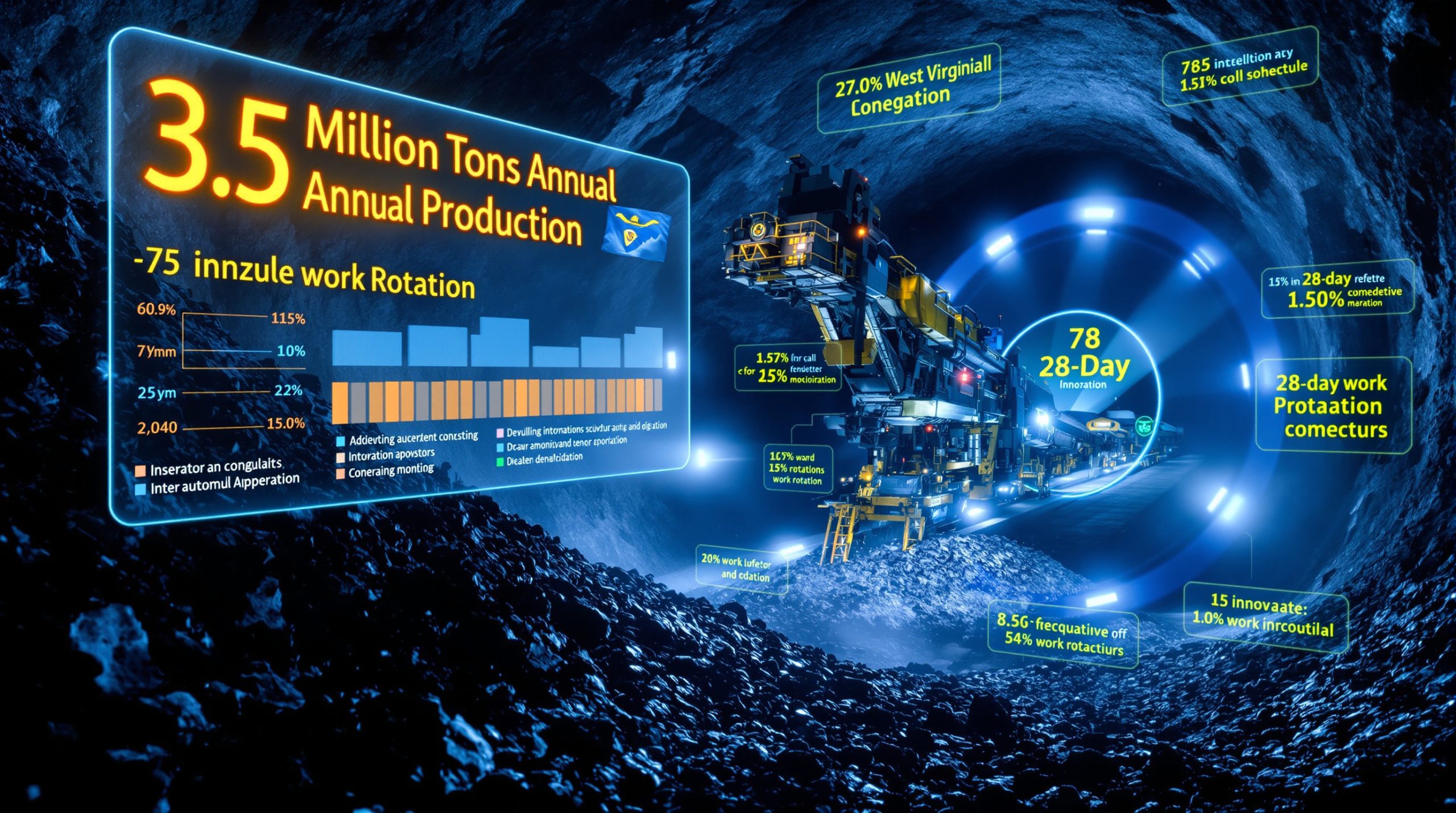Peabody Energy Terminates Anglo American Acquisition: Understanding the Fallout
On August 20, 2025, Peabody Energy officially announced the termination of its planned acquisition of Anglo American's steelmaking coal assets, a decision that sent ripples through the metallurgical coal industry. This cancellation marks a significant shift in strategy for both companies and highlights the substantial risks associated with underground mining challenges in the resources sector.
What Happened to the Peabody-Anglo American Deal?
The collapse of this major acquisition stems directly from an ignition event at the Moranbah North Mine in Queensland, Australia, which occurred in March 2025. Peabody Energy has cited a material adverse change (MAC) clause in their agreement as the legal basis for walking away from the deal.
Despite nearly five months of discussions and negotiations following the incident, the two mining giants failed to reach a revised agreement that would account for what Peabody describes as "material and long-term impacts" on the operation's most valuable asset.
"The two companies did not reach a revised agreement to cure the MAC that compensated Peabody for the material and long-term impacts of the MAC on the most significant mine in the planned acquisition," stated Jim Grech, Peabody President and CEO. "Peabody has chosen to terminate the transaction and will continue to execute our plans to create substantial value from our diversified global asset portfolio."
The Triggering Event: Moranbah North Mine Incident
The March 2025 ignition event at Moranbah North Mine has created an operational and financial quagmire for Anglo American. The incident, while reportedly causing minimal physical damage to infrastructure and equipment, has nevertheless resulted in:
- Complete suspension of all mining operations for nearly five months
- No conclusive determination of the cause behind the ignition event
- Absence of a clear timeline for resuming sustainable longwall production
- Monthly holding costs of approximately $45 million for Anglo American while the mine remains idle
The prolonged nature of the shutdown has proven particularly problematic. Even after five months, there remains significant uncertainty about when the mine might return to full operational status, creating a financial burden that continues to grow with each passing week.
Failed Negotiations and Disputed MAC Clause
At the heart of the dispute lies fundamentally different interpretations of whether the Moranbah North incident constitutes a material adverse change under the acquisition agreement:
- Peabody maintains that the extended shutdown represents a material and long-term impact on the most significant mine in the acquisition portfolio
- Anglo American disputes this interpretation, pointing to "the lack of damage to the mine and equipment" and "substantial progress" toward an eventual restart
- Anglo American claims to have offered technical alternatives and adaptations to preserve the deal
The disagreement has escalated to the point where Anglo American has announced plans to initiate arbitration proceedings against Peabody, seeking damages for what it characterizes as "wrongful termination" of the acquisition agreement.
Why Is This Acquisition Termination Significant?
The cancellation of this deal represents more than just a failed transaction—it signals important shifts in strategy for both companies and has implications for the broader metallurgical coal market.
Strategic Importance of the Assets
The terminated acquisition would have substantially expanded Peabody's metallurgical coal portfolio, particularly strengthening its Australian operations. The Moranbah North Mine was widely considered the crown jewel of the acquisition package, with:
- Projected output of 5.3 million tonnes of saleable production in 2025
- Status as one of Australia's premier steelmaking coal assets
- Central importance to the overall value proposition of the deal
For Peabody, acquiring these assets would have represented a significant strategic pivot toward metallurgical coal, which commands premium prices compared to thermal coal used in power generation. The loss of this opportunity forces a recalibration of the company's growth strategy.
Financial and Market Implications
The deal termination creates immediate and long-term financial consequences for both parties:
- Peabody must now pursue alternative growth strategies through its existing asset base
- Anglo American continues to bear the financial burden of approximately $45 million in monthly holding costs at Moranbah North
- Both companies face potential market valuation adjustments as investors reassess their growth prospects
- The metallurgical coal market may experience supply uncertainty as Moranbah North's return to production timeline remains unclear
Industry analysts note that the termination comes at a time when steelmaking coal prices have shown significant volatility, making the timing particularly challenging for Anglo American as it reassesses options for these assets. Furthermore, this situation has triggered concerns about potential investment risk flags for investors in the broader mining sector.
What Happens to the Dawson Mine Sale?
The termination has created a domino effect, impacting other planned transactions that were contingent on the main deal.
As a direct consequence of the primary acquisition termination, Peabody has also canceled a related transaction involving the Dawson Mine. This secondary deal with PT Bukit Makmur Mandiri Utama (BUMA) was specifically structured to be contingent upon the completion of the primary Anglo American acquisition.
The cancellation creates additional complexity in Anglo American's overall divestment strategy for its coal assets. The company now faces the challenge of potentially needing to find new buyers for both the steelmaking coal assets and the Dawson Mine, or alternatively developing new operational plans if these assets remain within its portfolio.
This secondary cancellation underscores how intricate multi-part mining transactions can become, with contingencies and conditions creating potential ripple effects across multiple assets and companies when a primary deal falters.
How Are Both Companies Responding?
The two mining giants have staked out clearly opposing positions following the termination, signaling different strategic directions and setting the stage for potential legal confrontation.
Peabody Energy's Position
Peabody has outlined a clear path forward following the termination, focusing on shareholder returns and organic growth:
- Commitment to distributing 65-100% of available free cash flow to shareholders
- Focus on share repurchases as the primary mechanism for returning capital
- Pursuit of organic growth opportunities within its existing global asset portfolio
- Maintenance of a strong balance sheet through disciplined capital management
This strategy appears designed to reassure investors that despite the terminated acquisition, Peabody remains financially disciplined and committed to shareholder value creation through its existing operations.
Anglo American's Response
Anglo American has expressed strong disagreement with Peabody's decision and interpretation of events:
- CEO Duncan Wanblad stated the company is "confident" the Moranbah North incident does not constitute a MAC
- Anglo American plans to initiate arbitration proceedings seeking damages for "wrongful termination"
- The company highlighted recent progress, including workforce sign-off on the risk assessment underpinning the restart strategy
"We are confident in our belief that the event at Moranbah North in March does not constitute a MAC under the sale agreements with Peabody," stated Duncan Wanblad, Anglo American CEO. "Our view is supported by the lack of damage to the mine and equipment, as well as the substantial progress made with the regulator, our employees and the unions, and other stakeholders as part of the regulatory process towards a safe restart of the mine."
Wanblad further emphasized, "We continue to reserve our rights under the definitive agreements, we are confident in our legal position and will shortly initiate an arbitration to seek damages for wrongful termination."
Anglo American must now focus on safely resuming operations at Moranbah North while maximizing value from its entire steelmaking coal portfolio, potentially under different ownership scenarios than initially planned.
What Challenges Does Moranbah North Mine Face?
The mine's operational future remains uncertain as multiple technical, regulatory, and financial hurdles must be overcome before production can resume.
Operational and Safety Hurdles
Before Moranbah North can return to production, several significant challenges must be addressed:
- Completion of a comprehensive regulatory process for safe restart
- Implementation of enhanced risk assessments and safety protocols
- Coordination with employees, unions, and other stakeholders
- Technical complexities associated with resuming longwall mining after an ignition event
The restart process for underground coal mines following safety incidents typically involves extensive testing, risk assessment, and regulatory approval. While Anglo American reports making "substantial progress" in this process, including "workforce signing off the risk assessment that underpins the restart strategy," the timeline for returning to production remains uncertain.
Financial Impact of Extended Shutdown
The prolonged shutdown continues to create significant financial pressure for Anglo American:
- Ongoing holding costs of $45 million monthly (approximately $225 million to date)
- Loss of projected 5.3 million tonnes of saleable production in 2025
- Uncertainty regarding future production volumes and potential operational adjustments
- Potential impact on Anglo American's broader portfolio management strategy
Each month of continued shutdown not only adds to the direct costs but also represents lost production value in a volatile commodity market, potentially impacting the asset's overall valuation in any future divestment attempts.
What Does This Mean for the Steelmaking Coal Market?
The extended shutdown of a major metallurgical coal producer creates ripple effects throughout the global steel supply chain. This situation exemplifies broader industry consolidation trends currently reshaping the resources sector.
Supply Chain Implications
Moranbah North's continued offline status affects various stakeholders in the metallurgical coal market:
- Reduced global supply of premium hard coking coal
- Potential price impacts, particularly in Australian premium metallurgical coal markets
- Adjustments required by steel producers who traditionally source from these operations
- Opportunity for competing producers to capture market share during the extended outage
The timing is particularly significant as global steel markets navigate post-pandemic demand patterns and ongoing transitions in major markets like China, where steel production policies continue to evolve. According to Reuters, the cancellation has already impacted market pricing for premium coal products.
Industry Consolidation Outlook
The failed transaction impacts the broader trend of consolidation in the coal sector:
- Pause in the recent pattern of coal asset transfers from diversified miners to coal specialists
- Potential reconsideration of asset values in the metallurgical coal space
- Questions about the future ownership structure of Anglo American's coal portfolio
- Implications for other potential transactions in the sector
This terminated deal may cause other potential buyers and sellers to reassess risk allocation in future transactions, particularly regarding operational continuity and force majeure events in underground mining operations. The situation highlights potential hostile takeover strategies that could emerge if Anglo American's assets become vulnerable during this period of uncertainty.
What Legal Actions Might Follow?
Anglo American's announcement of planned arbitration proceedings suggests a protracted legal battle may be brewing.
Potential Arbitration Process
The dispute now appears headed for formal arbitration:
- Anglo American has indicated it will initiate proceedings seeking damages
- The core dispute centers on interpretation of the MAC clause in acquisition agreements
- Both parties appear confident in their legal positions, suggesting a challenging resolution process
- The financial implications could be substantial depending on arbitration outcomes
Mining industry contracts typically include detailed arbitration provisions, often with specialized tribunals familiar with the complex technical and operational aspects of the industry. The process could take months or even years to fully resolve.
Precedent for Future Mining Transactions
The dispute could establish important precedents for future mining asset transactions:
- Clarification of how MAC clauses apply to operational disruptions without significant physical damage
- Guidance on risk allocation between buyers and sellers in complex mining deals
- Potential influence on due diligence requirements for underground mining acquisitions
- Impact on valuation methodologies for assets with recent operational disruptions
Legal experts suggest this case may become an important reference point for drafting future acquisition agreements in the mining sector, particularly regarding operational risk allocation.
FAQ: Key Questions About the Terminated Deal
Why was Moranbah North Mine so important to this deal?
Moranbah North represented the most significant asset in the planned acquisition portfolio, with projected output of 5.3 million tonnes of saleable production in 2025. As a premier Australian metallurgical coal operation, its operational status and financial performance were central to the overall value proposition and pricing of the transaction.
Could the deal be revived in the future?
While theoretically possible, Anglo American's announcement of arbitration proceedings suggests the relationship has deteriorated significantly. Any revival would likely require substantial changes to terms, valuations, and risk allocation between the parties. The financial and operational landscape would also need to stabilize, including a clear return to production at Moranbah North.
What happens to Anglo American's steelmaking coal portfolio now?
Anglo American will focus on safely resuming operations at Moranbah North while maximizing value from its entire steelmaking coal portfolio. The company may explore alternative divestment strategies, potentially involving different buyers or transaction structures, or might temporarily retain these assets longer than originally planned while working to demonstrate their operational stability and value.
How might this affect Peabody's growth strategy?
Peabody has indicated it will pursue organic growth through its existing asset base while maintaining its commitment to returning capital to shareholders. The company may explore alternative acquisition targets in the metallurgical coal space or accelerate development of its current portfolio. Their emphasis on share repurchases suggests confidence in their current asset base despite the acquisition setback.
The Path Forward for Both Companies
As the dust settles on this terminated transaction, both companies face strategic inflection points that will shape their futures in the global coal market.
Peabody's Strategic Pivot
Peabody must now refocus its growth strategy without the Anglo American assets:
- Leveraging existing operations to maximize production and efficiency
- Evaluating alternative acquisition opportunities that align with strategic goals
- Balancing shareholder returns with necessary capital investments
- Positioning for long-term competitiveness in a consolidating industry
Anglo American's Divestment Challenges
Anglo American faces several key decisions regarding its steelmaking coal portfolio:
- Prioritizing the safe restart of Moranbah North operations
- Reassessing the overall divestment strategy for coal assets
- Potentially engaging with new potential buyers once operations stabilize
- Balancing short-term financial pressures with long-term portfolio optimization
The coming months will prove critical for both companies as they adapt to this significant change in their expected trajectories. Investors, industry partners, and market analysts will be watching closely to see how each company navigates these challenges and pursues alternative paths to create shareholder value in the context of broader mining industry evolution.
As Anglo American stated in a press release, this situation represents "a challenging but temporary setback" in their overall portfolio management strategy, suggesting the company remains committed to finding the optimal path forward for these valuable assets.
Disclaimer: This article involves analysis of ongoing business transactions and operational challenges. The situation continues to evolve, and future developments may impact the assessment provided. Readers should consult official company communications and financial filings for the most current information.
Are You Prepared for the Next Major Mining Acquisition?
Stay ahead of transformative deals like the Peabody-Anglo American situation with Discovery Alert's proprietary Discovery IQ model, which delivers instant notifications on significant ASX mining developments and investment opportunities. Discover why major mining events can lead to substantial market returns by exploring our dedicated discoveries page and position yourself for success before the broader market reacts.




